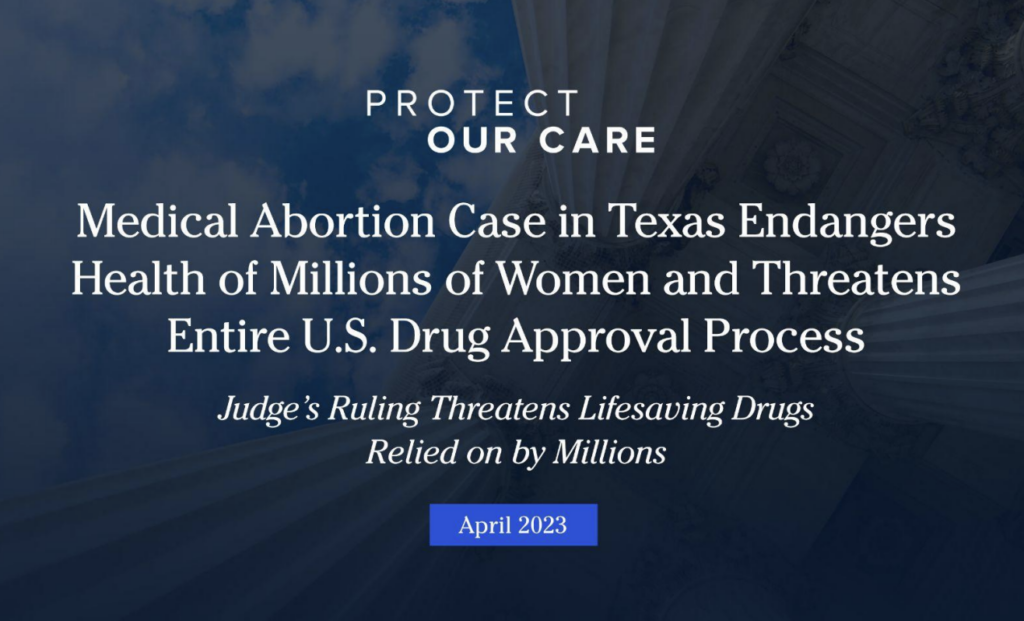Washington, DC – Last week, a federal judge in Texas issued a ruling revoking authorization for mifepristone, a safe and effective medication essential for abortion access that was approved by the FDA more than 20 years ago. Not only does this ruling risk barring the use of mifepristone for safe and legal abortions for millions of American women, but it opens the door for the politically-motivated removal of other safe and effective drugs from the market — throwing the entire U.S. drug approval process into chaos. Fierce opposition to the ruling has quickly emerged, with leaders in public health, former FDA and HHS officials, experts in the FDA, patient voices, and more than 400 top drug and biotechnology industry executives condemning the ruling. Read Protect Our Care’s new report on the case here.
HEADLINES
New York Times: Drug Company Leaders Condemn Ruling Invalidating F.D.A. Approval of Abortion Pill. “The pharmaceutical industry plunged into a legal showdown over the abortion pill mifepristone on Monday, issuing a scorching condemnation of a ruling by a federal judge that invalidated the Food and Drug Administration’s approval of the drug and calling for the decision to be reversed. The statement was signed by more than 400 leaders of some of the drug and biotech industry’s most prominent investment firms and companies, none of which make mifepristone, the first pill in the two-drug medication abortion regimen. It shows that the reach of this case stretches far beyond abortion. Unlike Roe v. Wade and other past landmark abortion lawsuits, this one could challenge the foundation of the regulatory system for all medicines in the United States. ‘If courts can overturn drug approvals without regard for science or evidence, or for the complexity required to fully vet the safety and efficacy of new drugs, any medicine is at risk for the same outcome as mifepristone,’ said the statement.” [New York Times, 4/10/23]
The Hill: Drug Companies Slam Texas Judge’s Ruling On Abortion Pill. “Drug industry experts, current and former administration officials and abortion rights advocates have been sounding the alarm that U.S. District Court Judge Matthew Kacsmaryk’s ruling in favor of anti-abortion groups would have far-reaching consequences for FDA’s authority. The decision ‘undermines our nation’s entire system of drug approval. It opens the door for courts to overturn FDA’s evidence-based decisions for purely political or ideological reasons,’ Health and Human Services Secretary Xavier Becerra said in a statement Friday after the ruling. If the decision is upheld, it could open the door to any third party to challenge any medication or treatment that they disagree with, including vaccines for children, AIDS drugs, birth control or hormone therapy. […] William Schultz, a partner at Zuckerman Spaeder and former FDA deputy commissioner, told reporters during a briefing Monday that the ruling adds another barrier for bringing drugs and treatments to the market. ‘In order to get a drug approved, companies will not just have to survive literally often hundreds of millions of dollars and years of testing [and] FDA scientific review, but then they’ll have to survive challenges in court, which could be immediate, or as in this case, 20 years later, Schultz said.” [The Hill, 4/10/23]
The Washington Post: Justice Department Appeals Texas Abortion Pill Ruling. “The Justice Department on Monday appealed a Texas judge’s decision that would block access to a key abortion drug across the country, arguing that the challengers had no right to file the lawsuit since they were not personally harmed by the abortion pill. The 49-page appeal, filed in the right-leaning U.S. Court of Appeals for the 5th Circuit, landed less than one business day after Judge Matthew J. Kacsmaryk suspended Federal Drug Administration approval of mifepristone — one of the two medications used in more than half of all abortions in the United States. […] The judge’s ruling, Justice Department lawyers said, ‘upended decades of reliance by blocking FDA’s approval of mifepristone and depriving patients of access to this safe and effective treatment, based on the court’s own misguided assessment of the drug’s safety.’” [The Washington Post, 4/10/23]
Talking Points Memo: Upholding Kacsmaryk’s Decision Would Invite Challenges To Vaccines, Contraception. “These problems with the case make it an enormous risk — even beyond making mifepristone unavailable for the millions who need it — should Kacsmaryk’s ruling be upheld. It could fling wide the floodgates to those seeking to challenge the FDA’s approval in an attempt to get certain drugs removed from the market. This danger could also prove mifepristone’s salvation: Even a fundamentally anti-abortion Supreme Court majority might be less inclined to uphold Kacsmaryk’s decision, given the severity of the ramifications. ‘Allowing the courts to do this, to do this kind of searching inquiry and overturn FDA if the judge thinks FDA was wrong in combination with the court’s ruling on standing…could allow virtually anyone to challenge any FDA drug approval decision with a good chance at succeeding,’ William Schultz, former deputy FDA commissioner and HHS General Counsel, told reporters Monday.” [Talking Points Memo, 4/11/23]
New York Times (Opinion): I Worked at the F.D.A. The Abortion Pill Decision Is Dangerous. “A federal judge in Texas has taken a shocking and irresponsible action: invalidating the Food and Drug Administration’s approval of mifepristone, a medication used safely by hundreds of thousands of women each year to help terminate pregnancies as part of a two-pill regimen. For what appears to be the first time, a court has invalidated an agency drug approval — an approval that was based on extensive review of scientific evidence, earned the unanimous support of outside experts and retains, after two decades, the full backing of major professional medical organizations. The decision is so stunning that it is reasonable to ask whether courts should have any role in reviewing the F.D.A.’s scientific decision-making at all. In fact, judges do have an important job: protecting the ability of the agency to use science and expert judgment to support the health of the American people. The Texas decision is a perversion of this role and, by undermining the F.D.A., represents a threat to the safety of millions of Americans.” [New York Times (Opinion), 4/10/23]
Washington Post: Texas Abortion Pill Ruling Threatens FDA. “Friday’s dueling decisions over a key abortion drug thrust the Food and Drug Administration into an unprecedented legal bind, imperiling its authority to approve and regulate medications, legal scholars said. In Washington state, a federal judge ruled Friday that mifepristone is safe and effective, ordering the FDA to preserve access to the pill in the 17 states and D.C. that sued to protect medication abortion. But in Texas, another federal judge sided with antiabortion groups to block the agency’s approval of mifepristone, a decision that won’t go into effect for seven days, to give the federal government a chance to appeal. ‘It is totally unclear how FDA is supposed to resolve this because this isn’t the way FDA does its job,’ said Kirsten Moore, director of the advocacy organization Expanding Medication Abortion Access Project. ‘It shouldn’t have to say in these states the drug is approved, in these states the drug isn’t approved. That’s not tenable.’” [Washington Post, 4/7/23]
Politico: The Abortion Pill Rulings Are Scaring The FDA and Drugmakers. Here’s Why. “A Texas judge’s decision to rescind the FDA’s approval of the abortion pill could jeopardize access to the most popular method of terminating a pregnancy. And many in government and inside the pharmaceutical industry fear that it could also undermine the agency’s broader authority to regulate medicines, opening the door for courts to question approvals of anything from birth control pills to new treatments for debilitating diseases. […] William Schultz, former deputy commissioner for the FDA and former general counsel for HHS, said the decision ‘could allow virtually anyone to challenge any FDA drug approval decision with a good chance of succeeding.’ ‘Any FDA drug approval involves hundreds of judgments by the agency. If a court feels free just to kind of take a fresh look at each of those, there’s a chance that a court will find one of those judgments is wrong,’ Schultz said. HHS did not immediately respond to a request for comment on Monday.” [Politico, 4/10/23]
New York Times: Why Drugmakers’ Battle in Texas is Such a Big Deal. “The decision by a judge in Texas to overturn F.D.A. approval for the abortion pill mifepristone could have consequences far beyond the fraught area of reproductive health, throwing the regulatory regime for medicines into disarray and potentially upending the business of drug making. The ruling to reverse a green light given more than 20 years ago has sparked a furious response from pharmaceutical executives, and the Biden administration is pushing for the decision to be blocked. More than 400 pharmaceutical and biotech industry leaders slammed the ruling. ‘Judicial activism will not stop here,’ they warned in an open letter on Monday, after Matthew Kacsmaryk, a federal court judge, sided with anti-abortion groups who challenged the F.D.A. approval of mifepristone over ‘safety concerns.’ Medical organizations such as the American Medical Association and the American College of Obstetricians and Gynecologists say the drug is safe, and the pharmaceutical executives called for ‘the decision to disregard science’ to be reversed. The Justice Department said Mr. Kacsmaryk’s findings were incorrect and that he had engaged in an ‘extraordinary and unprecedented’ effort to usurp the F.D.A.’s authority. Retrospectively overturning F.D.A. decisions that are based on years of testing could also destabilize the industry. Dr. Jeremy Levin, C.E.O. of Ovid Therapeutics and the former chairman of BIO, a biotech trade association, told The Times that the ruling opened the door to ‘a political determination of what a medicine is and isn’t.’ The precedent could be ‘deeply harmful for vaccines, Alzheimer’s drugs, all the others,’ he added.” [New York Times, 4/11/23]



